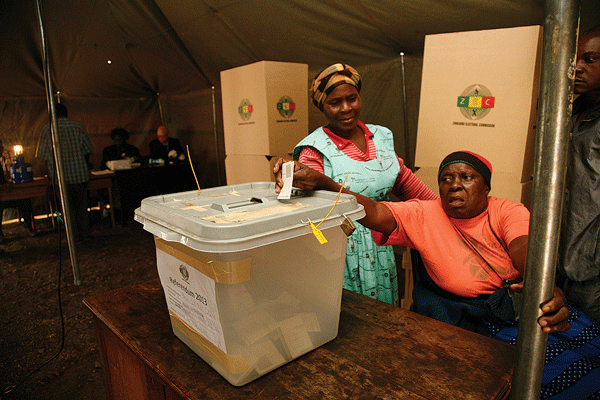
BY EVERSON MUSHAVA/ BLESSED MHLANGA
as ordered new voter registration in all wards across the country starting from September 14 and ending on January 15 next year.
According to Statutory Instrument 109 of 2017, Proclamation 6 of 2017, Mugabe said he has ordered the new registration as provided by section 36A(1)(a) of the Electoral Act (Chapter 2:13) after the Zimbabwe Electoral Commission (Zec) advised him of the need to conduct new voter registration in all wards and constituencies.
The section stipulates “that the President, on the advice of the Zimbabwe Electoral Commission, may at any time, by proclamation, order that there shall be a new registration in all wards and constituencies”.
“Now, therefore, under and by virtue of the powers vested in me as President, I do, by this proclamation order a new registration of voters in all wards and constituencies,” part of the proclamation read.
“. . . and fix Thursday, September14, 2017 as the date upon which the new registration will begin and fix Monday September 15, 2017 as the date upon which claims and applications for registration shall be received in all wards and constituencies.”
Zimbabwe holds its general elections next year with a new voters’ roll after the expected completion of the biometric voter registration by Zec. The new system works by capturing voters’ biometric data.
Poll watchdog the Election Resource Centre (ERC) urged Zec to conduct a voter registration process that conforms to international principles of voter registration.
- Chamisa under fire over US$120K donation
- Mavhunga puts DeMbare into Chibuku quarterfinals
- Pension funds bet on Cabora Bassa oilfields
- Councils defy govt fire tender directive
Keep Reading
“The voter registration process must be fair, comprehensive, and inclusive and easy to complete it,” ERC director, Tawanda Chimhini said.
“The commission must minimise or must make sure that there is no systematic exclusion of any group including the vulnerable and marginalised populations.
“Special measures are required to eliminate all barriers that might disenfranchise prospective voters.”
Mugabe, while addressing his Zanu PF central committee yesterday, implored senior party members to go around the country mobilising people to register to vote, as it was the only way his party could romp to landslide victory against what he described as a divided opposition.
“From here, I urge you all to go and mobilise members to register to vote. As you know, we are working on a new voters’ roll. All people should register to vote and this is the message you should carry to the people,” he said.
Meanwhile, the high cost of replacing lost identity cards or getting a new one in the case of Zimbabweans previously labelled aliens, could compromise the voter registration process.
Opposition political parties have slammed government for pegging the cost of replacing plastic or metal identity cards at $10, while “aliens” seeking to get new identity documents will have to part with $50, saying it was too high and prohibitive.
MDC-T spokesperson, Obert Gutu said the high costs would compromise the voters’ roll and exclude Zimbabweans from the voter registration process.
“We have already received reports that people are being called upon to pay no less than $10 for the replacement of a lost national ID. So-called aliens are also being called upon to pay no less than $50 to be allocated a new national ID confirming that they are Zimbabwean citizens, who will be entitled to register to vote,” he said.
“It is a notorious fact that more than 90% of Zimbabweans are surviving on less than $1 per day. Thus, it is very unfair and inconvenient to expect poverty-stricken people to fork out these rather exorbitant amounts of money in order to access new national IDs.”
The Zimbabwe Elections Support Network (Zesn) slammed the high cost, saying it had the potential of excluding thousands from voting.
“One of the key principles of voter registration is inclusivity and the high cost of obtaining the identity documents will be an impediment to a significant number of people’s ability to register,” Zesn said.
“We call on the Registrar-General’s Office to revisit the charges and consider making it affordable or even free of charge in order to incentivise and encourage voters’ participation.”
The RG launched a mobile voter registration exercise, particularly in rural areas, but it has so far been hit with payment challenges.
An official in the RG’s Office said the mobile registration units were only accepting cash payments, as there was no provision for plastic money or mobile payments.
“We are only accepting cash and lots of people are failing to get replacements because they don’t have the cash. It’s a big challenge, which I think was not considered ahead of deployment,” a source said.
The source also said the mobile teams had been instructed not to attend to aliens and, instead, to refer them to established offices of the RG.
“We are not dealing with the aliens. We have been instructed to refer them to our main offices for these applications,” the source added.











